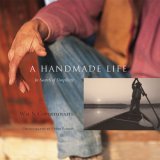In 2002, Chelsea Green published William Coperthwaite’s book A Handmade Life, In Search of Simplicity, and the book has now been released in paperback (read the review). It is a book that aspires to social design, and it is most perceptive and inspiring on the issues of childcare, the nurture of the young, apprenticeship and education.
- Nurture and apprenticeship
Bill Coperthwaite’s hopes for fairness, integrity and completeness in our lives and societies reside first of all with the children.
Coperthwaite holds both a Ph.D. in education from Harvard University and an unconventional view of the education of the young. The originality of his views, in fact, goes so far as to negate the usual meaning of “educationâ€. For one who is of the opinion that “many of the most important lessons in life can be learned but not taught,†and that the best lessons are learned through experience, nurture and encouragement are the preferred words.
If, when reading his book you think of Coperthwaite as a “guru†in the sense of a life-teacher, he will challenge you to put that in perspective. At most he will commit to this one line, which sums up his message for the young and those in charge of them: “Apprentices needed, not disciplesâ€.
- Non-violent, natural learning
Coperthwaite diagnoses several ills of traditional schooling, for one, the fact that it runs solely on competitiveness and compulsion, not enthusiasm, curiosity and self-confidence.
For most, school is “a parade of failures, one after the other, year after year, with ever more ‘proof’ of inadequacy.†For most, it is the threat of the law, social condemnation and the loss of “prospect†that keeps them there. And Coperthwaite is talking not just about the students, but the teachers too: all seem to be in school against their wishes. It’s a sure recipe for disaster.
But all children are naturally excited and eager to learn. To nurture that, he proposes “non-violent learningâ€, in which all are learners, young and old, chose the curriculum and participate in a voluntary and firsthand exploration of the world.
Central to his are three components, the first of which is nature.
- Nature
It is no surprise that Coperthwaite, who is homesteading “off the grid†in the wilds of Maine, locates the best kind of learning in nature. He asks: what are the most important geographical factors in your child’s life? A tree, the sky, the sea? Or the convenience store, parking lot, TV?
He is not advocating that we all go back to homesteading. His proposes not “back to the landâ€, but rather “down to earthâ€.
Nature inspires awe and tranquility. She teaches small, bite-size lessons – the ways of bees and grain – and, once in a while, whopping big ones too – as when a storm overtakes a scouting party and spurs survival instincts. All of these will teach a child about life: how it works, and also, more importantly, how to interpret and deal, indeed live, with it.
A close connection to nature not only heals the child – one need only read Richard Louv’s recent book, Last Child in the Woods (2006) for scientific and practical confirmation of that statement – but the earth as well, when that child grows up to be a good steward of it.
- More remedies
Coperthwaite’s other prescriptions for a better education are a context of home and family, and a feeling of usefulness through physical work, whether it be work on the land or in crafts. I’ve written about these here.

re: “a parade of failures, one after the other, year after year, with ever more ‘proof’ of inadequacy†…
i was just talking the other day with someone about how school tends to push a child along so that they are always having to deal with something new, always getting tested and graded, but then shoved along to something new again .. so, unless you are a straight-A, you often feel crummy about yourself, focusing on what you got wrong or didn’t understand.
whereas with homeschooling (at least – the way we do it! ;^), you work on something until you understand it, until you have mastered it. so you usually feel good about yourself – and you can focus on your ability to meet challenges, solve problems, etc., even more than on specific knowledge you may have accumulated.